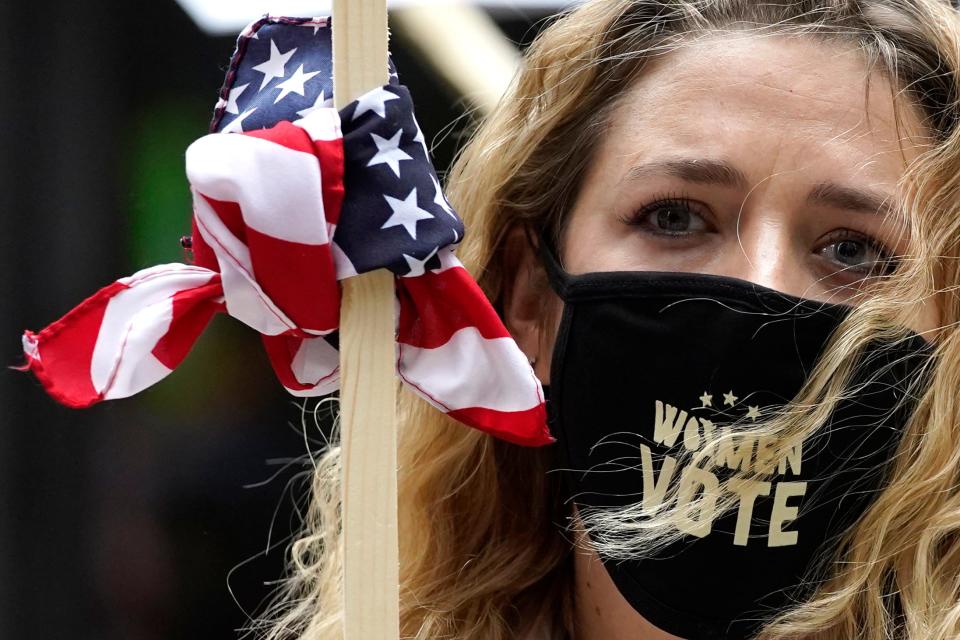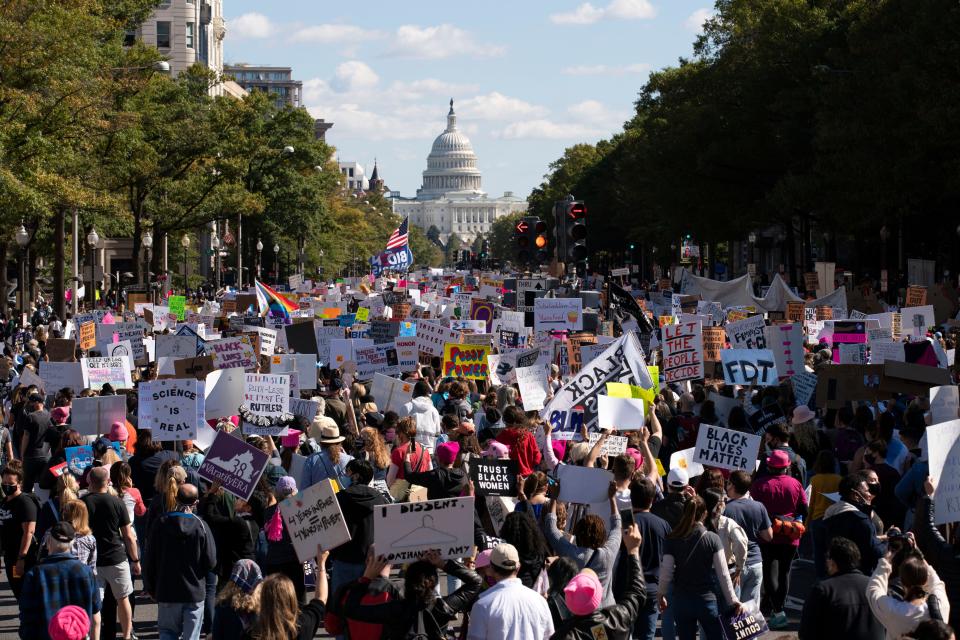Women donors emerge as new power brokers in 2020 election as Democrats look to flip the Senate
WASHINGTON – Record-high campaign contributions from women helped Democrats take the House in 2018 and now women have their sights set on the Senate.
In the 15 most competitive Senate races, an average 43% of the large-dollar donors to Democratic candidates are women compared to 28% of donors to Republicans, according to a USA TODAY analysis of data from the nonpartisan Center for Responsive Politics.
Women are also setting a record for the total amount of money they're contributing to all congressional candidates, according to the center.
2020 Senate races: Arizona, Georgia, Maine, Iowa are among the contests to watch
Men have long been responsible for the majority of campaign contributions to congressional candidates.
Even in 1992’s “Year of the Woman” that increased the number of women in the House and Senate, only 26% of all congressional campaign contributions came from women.
That grew to 38% in 2018, when a record number of female candidates helped Democrats take the House.

Sheila Krumholz, executive director of the center said the increased participation of women donors is huge, compared with the slow growth of that demographic over the past 30 years.
“This is true both in terms of sums contributed and – especially – the number of women donors giving,” she said. “This surge kicked in in the 2016 cycle with Hillary Clinton’s White House run as critical driver, and stayed elevated in 2018, so the wave of politically active women in 2020 continues an important new trend.”
'Will you shut up, man?' Highlights from the slugfest between Donald Trump and Joe Biden in Cleveland
Trump dials it back: The final Trump debate with Biden was calmer. Here are other takeaways from the encounter
Nearly half of the donors to Kentucky’s Amy McGrath are women in her uphill challenge to Senate Majority Leader Mitch McConnell, R-Ky. About one-third of McConnell’s backers are women – the largest share of female donors in the 15 races examined by USA TODAY.
"In order to make any progress, we not only have to have a change in the presidency, but a change in Senate leadership because the Senate is where everything is being blocked," said Madeleine Wachter, a longtime political activist in Tucson, Arizona, who has contributed to Democrats in multiple top Senate races – including to McGrath.
In the Senate race in Maine, where both the Democrat and Republican are women, 26% of GOP Sen. Susan Collins’ donors are women. That contrasts with 42% of those who contributed to her rival, Sara Gideon.
Women aren’t stepping up just for female Democrats.
The financial backers of Mark Kelly, the Arizona Democrat who has a lead in the polls over GOP Sen. Martha McSally, are almost evenly divided between men and women. About three-quarters of McSally’s donors are men. That’s the biggest gender gap among donors in the most competitive Senate races.
The smallest difference is in Montana's Senate race. About 38% of the donors to Democratic Gov. Steve Bullock are women compared with 32% of Republican Sen. Steve Daines’ contributors.

Since the Women’s March the day after President Donald Trump’s inauguration, women have stepped up their involvement in politics – as candidates, donors and volunteers.
“And this year, Democratic candidates across the country are putting up record fundraising numbers thanks to the women and the giving circles on this call,” Sen. Kirsten Gillibrand, D-N.Y., said on a recent fundraising call for the Biden campaign that included organizers for the Electing Women Alliance.
'Mr. Vice President, I'm speaking': Mike Pence and Kamala Harris face off in debate
The group, which partners with Gillibrand’s Off the Sidelines PAC, raises money from women for female – and some male – candidates across the country.
Arizona List, the state version of the national group EMILY'S List, is supporting a record number of Democratic women candidates this year, said Wachter, the Arizona activist who serves on the group's board.
Wachter called that the "positive impact" of Trump as women stepped forward and said, 'I have to do my part.'"
A survey conducted at the end of last year for the Barbara Lee Family Foundation and American University’s Women & Politics Institute found women of all ages had become more politically engaged since 2016. More than one-third of Democrat women said they’d gotten more involved in politics compared with 27% of Republican women and 23% of independents.
Women have also become more invested in the Democratic Party.
The share of female registered voters who identify with the Democratic Party grew to 56% in surveys conducted in 2018 and 2019 versus 48% in 1994, according to the Pew Research Center. The share who identify with the GOP dropped to 38% from 42% over the same period.

The Senate donations analyzed by USA TODAY cover donations made through September. Contributors who give $200 or less do not have to be identified so are not included in the calculations.
Democrats have enjoyed a fundraising edge among both small and large donors for the 35 Senate seats on this year’s ballots.
USA TODAY looked at the campaign contributions in the 15 races that the Cook Political Report rates as have some chance of changing partisan hands.
Overall, the nonpartisan handicapper says Democrats are favored to win the Senate and could gain as many as seven seats. Democrats need a net gain of either three or four seats to gain control of the Senate, depending on the outcome of the presidential race. If Joe Biden wins, Kamala Harris could break any ties in Senate as vice president.
This article originally appeared on USA TODAY: Flip Senate: Women make record campaign donations to help Democrats

